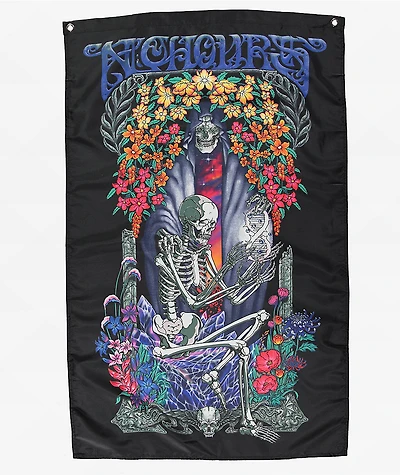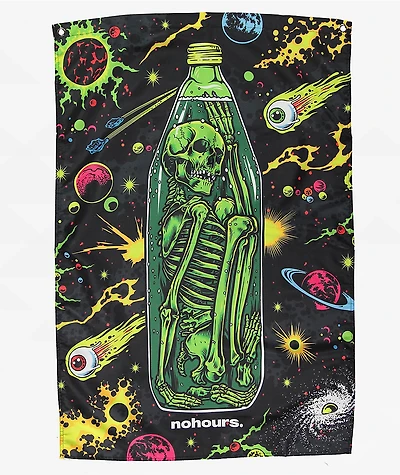Home
Black Hours
Barnes and Noble
Loading Inventory...
Black Hours in Bloomington, MN
Current price: $27.99


Black Hours in Bloomington, MN
Current price: $27.99
Loading Inventory...
Size: OS
With
Black Hours
, frontman
Hamilton Leithauser
became the second member of
the Walkmen
to surface with new music during the band's "extreme hiatus" (the first being
Walter Martin
with his charming children's album
We're All Young Together
). It's often difficult for lead singers to make a break from their previous work since they're such a defining force in a band's sound.
Leithauser
happens to be one of indie rock's most distinctive vocalists, as well as one of the most versatile; the way he switched from a
Dylanesque
sneer, a
Bono
-like wail, or a
Sinatra
-worthy croon made him an invaluable part of
's fiery yet reflective music. Perhaps it's not surprising, then, that
feels more like an extension of his work with that band than a drastic departure from it.
puts the album's biggest surprise first: "5 A.M.," a fabulous ballad inspired by
classics such as
In the Wee Small Hours
, dives into throaty, string-laden drama without ever seeming too theatrical. It's a bold start, and a somewhat misleading one; the rest of
expands on
's legacy in more familiar ways. "St. Mary's County," a collaboration with bandmate
Paul Maroon
(who also provided many of the album's string and horn arrangements), is the kind of dreamy, drifting ballad that populated latter-day albums like
You & Me
. Conversely, "Alexandra" and "I Don't Need Anyone" are brash, swaggering, and secretly vulnerable standouts that also remain well within
's wheelhouse. The older-and-wiser feel of the band's gorgeous maybe-swan song
Heaven
continues on "The Smallest Splinter," which finds
just as dramatic and demanding running toward love as running away from it, and on "I Retired," where lyrics like "No one knows what I was fighting for/I don't even know myself anymore" can't help but feel like a response to the fury of songs such as "The Rat."
' most intriguing moments make the most use of the orchestral touches that set the album apart from
's previous work, whether it's the marimba on "The Silent Orchestra" or the beautiful "Self-Pity," which combines one of his finest vocal performances yet with graceful strings and moody,
Stones-y
rock. It would be unfair to call
a missed opportunity; even if its glimpses at fresher musical territory are tantalizing,
carries on
's tradition in ways that fans will welcome. ~ Heather Phares
Black Hours
, frontman
Hamilton Leithauser
became the second member of
the Walkmen
to surface with new music during the band's "extreme hiatus" (the first being
Walter Martin
with his charming children's album
We're All Young Together
). It's often difficult for lead singers to make a break from their previous work since they're such a defining force in a band's sound.
Leithauser
happens to be one of indie rock's most distinctive vocalists, as well as one of the most versatile; the way he switched from a
Dylanesque
sneer, a
Bono
-like wail, or a
Sinatra
-worthy croon made him an invaluable part of
's fiery yet reflective music. Perhaps it's not surprising, then, that
feels more like an extension of his work with that band than a drastic departure from it.
puts the album's biggest surprise first: "5 A.M.," a fabulous ballad inspired by
classics such as
In the Wee Small Hours
, dives into throaty, string-laden drama without ever seeming too theatrical. It's a bold start, and a somewhat misleading one; the rest of
expands on
's legacy in more familiar ways. "St. Mary's County," a collaboration with bandmate
Paul Maroon
(who also provided many of the album's string and horn arrangements), is the kind of dreamy, drifting ballad that populated latter-day albums like
You & Me
. Conversely, "Alexandra" and "I Don't Need Anyone" are brash, swaggering, and secretly vulnerable standouts that also remain well within
's wheelhouse. The older-and-wiser feel of the band's gorgeous maybe-swan song
Heaven
continues on "The Smallest Splinter," which finds
just as dramatic and demanding running toward love as running away from it, and on "I Retired," where lyrics like "No one knows what I was fighting for/I don't even know myself anymore" can't help but feel like a response to the fury of songs such as "The Rat."
' most intriguing moments make the most use of the orchestral touches that set the album apart from
's previous work, whether it's the marimba on "The Silent Orchestra" or the beautiful "Self-Pity," which combines one of his finest vocal performances yet with graceful strings and moody,
Stones-y
rock. It would be unfair to call
a missed opportunity; even if its glimpses at fresher musical territory are tantalizing,
carries on
's tradition in ways that fans will welcome. ~ Heather Phares
With
Black Hours
, frontman
Hamilton Leithauser
became the second member of
the Walkmen
to surface with new music during the band's "extreme hiatus" (the first being
Walter Martin
with his charming children's album
We're All Young Together
). It's often difficult for lead singers to make a break from their previous work since they're such a defining force in a band's sound.
Leithauser
happens to be one of indie rock's most distinctive vocalists, as well as one of the most versatile; the way he switched from a
Dylanesque
sneer, a
Bono
-like wail, or a
Sinatra
-worthy croon made him an invaluable part of
's fiery yet reflective music. Perhaps it's not surprising, then, that
feels more like an extension of his work with that band than a drastic departure from it.
puts the album's biggest surprise first: "5 A.M.," a fabulous ballad inspired by
classics such as
In the Wee Small Hours
, dives into throaty, string-laden drama without ever seeming too theatrical. It's a bold start, and a somewhat misleading one; the rest of
expands on
's legacy in more familiar ways. "St. Mary's County," a collaboration with bandmate
Paul Maroon
(who also provided many of the album's string and horn arrangements), is the kind of dreamy, drifting ballad that populated latter-day albums like
You & Me
. Conversely, "Alexandra" and "I Don't Need Anyone" are brash, swaggering, and secretly vulnerable standouts that also remain well within
's wheelhouse. The older-and-wiser feel of the band's gorgeous maybe-swan song
Heaven
continues on "The Smallest Splinter," which finds
just as dramatic and demanding running toward love as running away from it, and on "I Retired," where lyrics like "No one knows what I was fighting for/I don't even know myself anymore" can't help but feel like a response to the fury of songs such as "The Rat."
' most intriguing moments make the most use of the orchestral touches that set the album apart from
's previous work, whether it's the marimba on "The Silent Orchestra" or the beautiful "Self-Pity," which combines one of his finest vocal performances yet with graceful strings and moody,
Stones-y
rock. It would be unfair to call
a missed opportunity; even if its glimpses at fresher musical territory are tantalizing,
carries on
's tradition in ways that fans will welcome. ~ Heather Phares
Black Hours
, frontman
Hamilton Leithauser
became the second member of
the Walkmen
to surface with new music during the band's "extreme hiatus" (the first being
Walter Martin
with his charming children's album
We're All Young Together
). It's often difficult for lead singers to make a break from their previous work since they're such a defining force in a band's sound.
Leithauser
happens to be one of indie rock's most distinctive vocalists, as well as one of the most versatile; the way he switched from a
Dylanesque
sneer, a
Bono
-like wail, or a
Sinatra
-worthy croon made him an invaluable part of
's fiery yet reflective music. Perhaps it's not surprising, then, that
feels more like an extension of his work with that band than a drastic departure from it.
puts the album's biggest surprise first: "5 A.M.," a fabulous ballad inspired by
classics such as
In the Wee Small Hours
, dives into throaty, string-laden drama without ever seeming too theatrical. It's a bold start, and a somewhat misleading one; the rest of
expands on
's legacy in more familiar ways. "St. Mary's County," a collaboration with bandmate
Paul Maroon
(who also provided many of the album's string and horn arrangements), is the kind of dreamy, drifting ballad that populated latter-day albums like
You & Me
. Conversely, "Alexandra" and "I Don't Need Anyone" are brash, swaggering, and secretly vulnerable standouts that also remain well within
's wheelhouse. The older-and-wiser feel of the band's gorgeous maybe-swan song
Heaven
continues on "The Smallest Splinter," which finds
just as dramatic and demanding running toward love as running away from it, and on "I Retired," where lyrics like "No one knows what I was fighting for/I don't even know myself anymore" can't help but feel like a response to the fury of songs such as "The Rat."
' most intriguing moments make the most use of the orchestral touches that set the album apart from
's previous work, whether it's the marimba on "The Silent Orchestra" or the beautiful "Self-Pity," which combines one of his finest vocal performances yet with graceful strings and moody,
Stones-y
rock. It would be unfair to call
a missed opportunity; even if its glimpses at fresher musical territory are tantalizing,
carries on
's tradition in ways that fans will welcome. ~ Heather Phares

![Golden Hour, Pt. 1 [DIARY Ver.] [Barnes & Noble Exclusive]](https://prodimage.images-bn.com/pimages/0810141851702_p0_v1_s600x595.jpg)
![GOLDEN HOUR : PART. 2 [DIARY Ver.] [ Barnes & Noble Exclusive]](https://prodimage.images-bn.com/pimages/0810141853300_p0_v4_s600x595.jpg)














